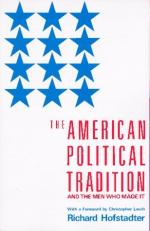
|
| Name: _________________________ | Period: ___________________ |
This test consists of 15 multiple choice questions and 5 short answer questions.
Multiple Choice Questions
1. With which political party was William Jennings Bryan associated?
(a) The Republican Party.
(b) The Democratic Party.
(c) The Libertarian Party.
(d) The Progressive Party.
2. What policy did Woodrow Wilson create to promote partnerships between government and corporations?
(a) A New Day.
(b) The New Deal.
(c) The Corporate Act.
(d) New Freedom.
3. When did William Jennings Bryan resign from Woodrow Wilson's cabinet?
(a) After the United States entered the war in 1917.
(b) After the Treaty of Versailles was signed.
(c) After the Japanese bombed Pearl Harbor.
(d) After the Germans sank the Lusitania in 1915.
4. What position did Herbert Hoover hold in both Presidents Warren Harding and Calvin Coolidge's cabinets?
(a) Attorney General.
(b) Secretary of Commerce.
(c) Secretary of State.
(d) Secretary of War.
5. How does Hofstadter view Franklin Roosevelt?
(a) He was an average man endowed with natual charisma.
(b) His philosophies shaped many foundational American ideals.
(c) As one of the most important personalities in history.
(d) His foreign policies saved the nation.
6. Who won the presidential election in 1916?
(a) William Howard Taft.
(b) Woodrow Wilson.
(c) Warren G. Harding.
(d) Theodore Roosevelt.
7. Where did Herbert Hoover gain his diplomatic experience?
(a) In Europe during World War I.
(b) Though an internship with the American Red Cross.
(c) While fighting in Italy.
(d) While at Harvard.
8. To which politician does Hofstadter compare Woodrow Wilson?
(a) Edmund Burke.
(b) Theodore Roosevelt.
(c) Thomas Jefferson.
(d) Karl Marx.
9. What did the Great Depression force Herbert Hoover to do?
(a) Freeze federal funds.
(b) Close private banking system.
(c) Implement policies that he opposed philosophically.
(d) Use the National Guard to control private citizens.
10. What conflict did Herbert Hoover have with Franklin D. Roosevelt?
(a) He opposed Roosevelt's economic policies.
(b) Roosevelt disagreed with Hoover's foreign policy.
(c) He argued with Roosevelt over foreign policy.
(d) They each blamed the other for the Depression.
11. What did the supporters of the free silver movement wish for the government to do?
(a) Establish a standard monetary system.
(b) Repeal federal taxes.
(c) Mint silver for free.
(d) Allow all Americans access to minted currency.
12. Which movement did not approve of Grover Cleveland's policies?
(a) The socialist movement.
(b) The abolitionist movement.
(c) The populist movement.
(d) The democratic movement.
13. According to Hofstadter, which politician represented the interests of those who survived Reconstruction in the South?
(a) Woodrow Wilson.
(b) James Garfield.
(c) Grover Cleveland.
(d) William Jennings Bryan.
14. Who was elected president of the United States in 1912?
(a) William Howard Taft.
(b) Henry Cabot Lodge.
(c) Theodore Roosevelt.
(d) Woodrow Wilson.
15. What physical changes occurred during the Gilded Age?
(a) The South was revived by industry.
(b) Americans colonized the entire continent.
(c) The United States fought for and won Texas.
(d) Americans explored from the east coast to the Rocky Mountains.
Short Answer Questions
1. What political changes occurred during the Gilded Age?
2. For which political party was Theodore Roosevelt the nominee in 1912?
3. With which controversial group is William Jennings Bryan associated?
4. At what university was Woodrow Wilson president?
5. What did Herbert Hoover study while in school?
|
This section contains 508 words (approx. 2 pages at 300 words per page) |

|




